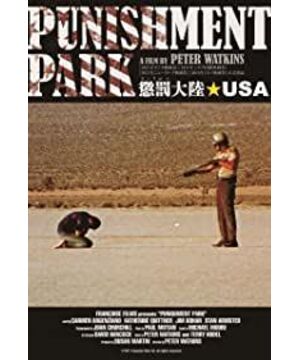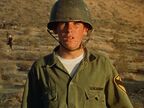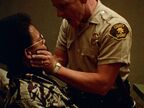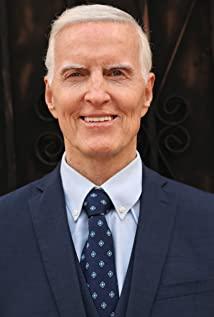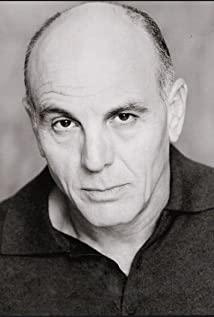Don't think that people who like entertainment news are superficial. Although the gossip articles are heartless and heartless, they often come up with a few profound truths. For example, Madonna, who is a middle-aged mother, is no longer like a virgin but like a preacher in the face of a group of voyeuristic Papalazzi. I still remember her words about parenting experience, which literally catalyzed Sister Mai from a sex symbol to my life mentor. She said this: The most important thing is to teach her daughter to say NO.
Learning to say "NO" is really important, and that is the first step in thinking about life. Knowing how to say "NO" means you have free will. How valuable is free will? In short, it can tell you whether you are a man or a beast. However, when it comes to the difficulty of having free will, Pete Watkins must have a deeper understanding than the older sister Mak. He did not just talk about entertainment in general, but in 1971, he filmed a "Punishment Park" as its own expression.
As a well-known "pseudo-documentary", "Punishment Park" has a real historical background: when the Cold War, the Korean War, and the Vietnam War ensued, an anti-communist storm was aroused in the United States to clamp down on free thoughts, and defend free will. He was identified as suspected of endangering national security, and he was arrested and interrogated on a large scale. The "pseudo" of the "pseudo-documentary" is because Watkins created a fictional "punishment park" in the desert of the United States, where all those suspected of endangering national security were brought here by repentance groups and accepted autocratic rule. trial and punishment. The destruction of free will by autocratic rule is so absurd and violent, it obviously goes beyond the ethical scope and actual conditions of a democratic and free country. Of course, Punishment Park bears the brunt of punishment—it becomes a banned film.
There are two main lines running through the whole film. One recounts the trial of free will people. Inmates assigned to Repentance Unit 638 were convicted by the National Security Court for their words and deeds. The verdict asked them to choose between two punishments: be thrown into jail, where they could spend years to decades in prison, or go into a "punishment park" for three days before being released. Since prisoners were arrested precisely because they could think for themselves, they chose the latter without exception. Common sense and common sense told them that the "Punishment Park" was just a piece of desert, and it was definitely better to spend three days in high temperature and desolation than decades of imprisonment. I am not free, my teeth are shattered, I am afraid that the bars are still there. Free will encourages people to reflect on the status quo and think according to common sense, and its shortcomings are also here. If you give up free will, isn't that one with a tyrant? If you choose free will, then please accept the destiny arranged for you by the tyrants, they only want you to die!
Another line tells the fate of the free wills after they enter the park. Personnel from the Repentance Group No. 637 have chosen to enter the "Punishment Park" to receive punishment. The rules in the park are as follows: if they can reach the flag more than ten kilometers away by the set route within three days and two nights, they can be released. Soldiers would start chasing them 2 hours after they set off, and getting caught would mean nothing. The scorching sun is scorching, there is no water and no food, the yellow desert is deserted in front, and there are fierce pursuers behind, the flag representing freedom is always flying in the distance, how to get there? It goes without saying that they were swept back and killed on the way. Even if they were exhausted and escaped to hide under the flag, they found that soldiers were already stationed there, and touching the flag was always just a gesture, not a fact.
The two main lines are not one after the other. Watkins cleverly cuts the two lines together, and the interspersed images can even arouse the viewer's thinking. The trial court was not solemn and solemn, only simple and vulgar. The suspect was handcuffed and chained, and the torture instruments were complete. The trial process is like a direct sentence, with no questioning and cross-examination debates. The trial is like a mad wild horse, directly pulling the suspect to the grave of the traitor. The Punishment Park is a trap. The punished resisted and fled all the way, ran for their lives, anxious, hungry, desperate, helpless, and exhausted all means, and the result was either death or arrest. In the end, what they waited for was not freedom, but their own gunshot wounds. The accusations and rebuttals between the prisoners and the judges, the flight and the killings between the punished and the soldiers, let us see how the head of free will punishment is bruised and bruised by authoritarian violence.
The two narrative lines are full of well-designed details, alluding to reality and full of meaning, which is the wonderful thing about "pseudo-documentary". For example, before the trial, the bailiff routinely announced that the trial was authorized by an executive order. In the United States, where the separation of powers was the clearest, the expansion of executive power was the norm in American politics at that time. The rise of the Iron Curtain made the ideological competition intensified, and the United States had to introduce a president with a high degree of power and autonomy to strengthen its rule. Beginning with Roosevelt's New Deal, the presidential constitutional government advanced rapidly, and was finally developed to the extreme by "Emperor President" Nixon. The film's shaky footage occasionally sweeps across the background of the hearing, where a portrait of Nixon hangs. It seems that the president at this time has replaced the balance of the goddess of justice, and he is the most authoritative God.
The details are also reflected in the image settings of the two groups of personnel. The members of the adjudication team representing the autocratic system dress rigorously and have a rigid expression. The criminals who represent free will are slovenly dressed and casual, but they really exude the breath of freedom from the inside out. There is no doubt that the gentlemen and ladies with solemn make-up sitting on the top allude to the big business and big entrepreneurs who joined forces with the autocracy at that time. During the war years, they actively cooperated with the government. After the war, they asked the government to restrain free thought, because the development of the latter greatly affected their harvest of interests. The director sets up a girl from a wealthy family. Due to the similar circumstances, the girl's questioning made it impossible for the judges to resist. When the girl satirized that the tyranny had already controlled the minds of the children of the powerful, they were speechless and could only say that if our children become like you, they will be influenced by you, because you can only sing "kill people" ,kill". As soon as the camera turns, the killing of free wills in "Punishment Park" is going on. Brilliant irony!
Watkins contrasts the trial process with the punishment in the park, expressing that when a dictator cannot ideologically conquer free will, it will raise the scythe of death, and violence is its terrible weapon and only means. When the prisoners ran to the national flag, the soldiers began to practice shooting with various firearms, looking forward to a thrilling desert hunt; when the punished were beaten down, the soldiers said they just surrendered peacefully; when the free wills were cornered, We have to put aside our thoughts and convert to violence, and the reason is to say through the mouth of a thin black man, this fucking game puts us in a revolution, and we either win or die. Violence begets violence, violence overcomes violence, and violence against violence. Human beings gradually forget their noble rationality, and primitive violence begins to spread. The autocratic ruler empties the human spirit and leaves the beast-like wreckage. This is the finishing touch of Watkins.
So, when we can still say "NO", we still have the dignity of life and good hope, because, when we can never say "NO", what are we not puppets?
View more about Punishment Park reviews


